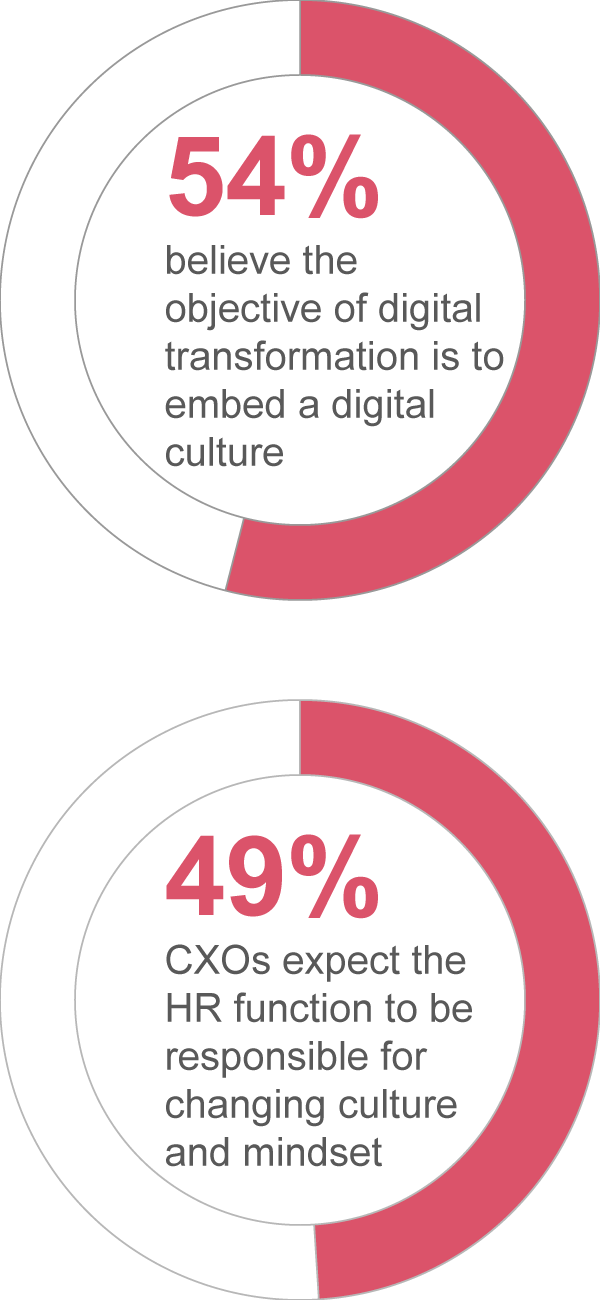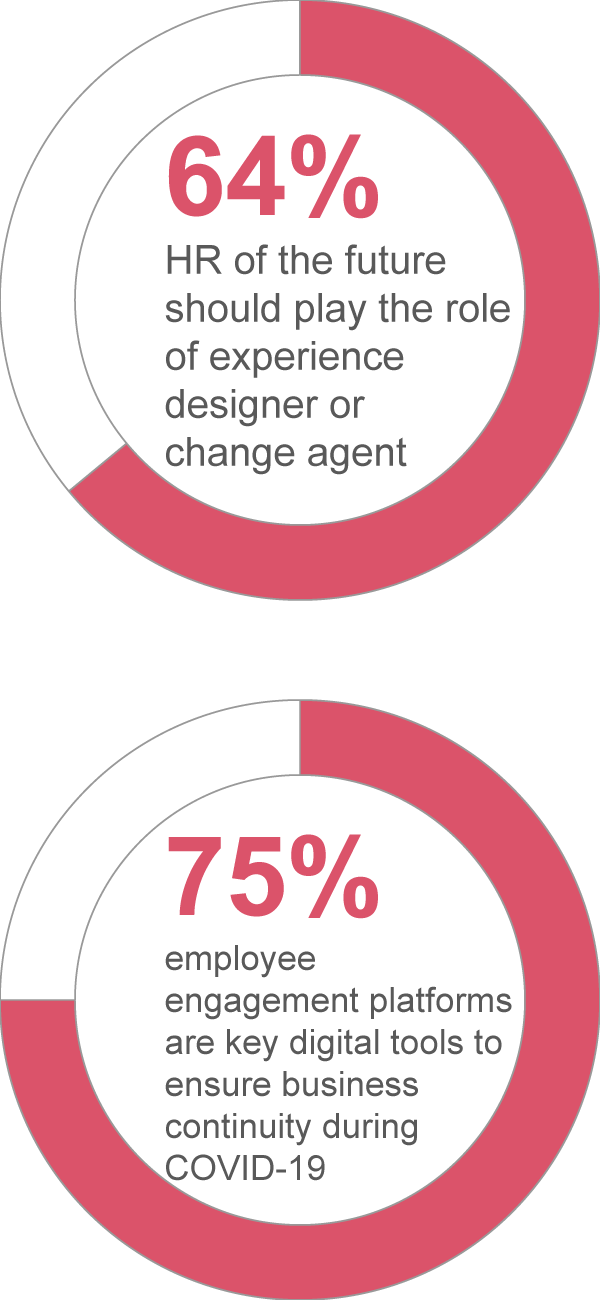{{item.title}}
{{item.text}}

{{item.text}}
As organisations increasingly focus on digital strategies for growth, the role of human resource (HR) leaders is changing, creating a strong opportunity for them to redefine and reposition the digital HR agenda while responding to the pressing needs of their organisation in the current climate.
PwC’s Digital HR Transformation Survey 2022 reveals that a vast majority (96%) of HR leaders see the role of HR moving away from being just a service provider to focus more on being employee experience designers, change agents and talent developers. Additionally, the survey results highlight that HR’s contribution in an organisation’s digital transformation goes way beyond digitising the HR function.
As employees today increasingly deal with digital disruptions, most HR leaders believe that upskilling (57%) and managing a changing culture and mindset (49%) are becoming more important. Yet, only one out of four HR leaders indicate that they have a clearly defined digital HR transformation strategy cascading across the organisation.
This publication provides Southeast Asia’s top HR leaders’ perspectives and the key insights from PwC’s Digital HR Transformation Survey 2022, conducted in July last year, across five countries in Southeast Asia including Singapore, Thailand, Malaysia, Indonesia and Vietnam.
In our 2021 Global Culture survey, 72% of senior leaders reported that their culture helps successful change initiatives happen. More than half (54%) of the HR leaders in our survey indicated that embedding a digital culture is high on their transformation agenda. Creating a digital mindset and digital-first culture to how organisations service their customers and clients is seen as one of the critical success factors of digital transformation.
Our research showed organisations seem to expect the HR function to be responsible for driving the cultural and mindset change. Nearly half (49%) of the HR leaders indicated that their leadership teams expect the HR function to be responsible for the required culture and mindset change. However, having leadership ownership is one of the key success factors of a culture change is the extend in which senior leaders take ownership. In the process of embedding a digital culture, business leaders must ensure digitisation across all aspects and functions on the organisation while roping in HR function to support and push the agenda.
As HR tools play a big part in reshaping how employees think, feel and interact with technology, it is crucial that these tools and experiences are aligned with the overarching digital culture. HR technology is at the front-end of employee interactions and is able to set the foundation for a digital mindset and culture in employees. Find out more on strategies to establish a digital culture.
Our 2021 Hopes and Fears report indicated that the majority (61%) of employees are positive about the impact of technology on their day-to-day work. However, only a third of the workers (33%) are given many opportunities to develop digital skills outside their regular roles.
In this survey, more than one third of the HR leaders indicated that a lack of digital skills and a fear of not being able to acquire them is one of the main obstacles of digital transformation. Senior leaders in the organisation as well as HR leaders recognise the role of the HR function to help bridge the skills gap. Seventy percent of HR leaders see upskilling the workforce and closing the digital skills gap as HR's contribution to digital transformation. This message is echoed by senior management and leadership as more than half (57%) expect HR to be responsible for upskilling employees as part of the digital journey.
To achieve this, an organisation’s digital HR transformation objectives should to be provide the platform to enable upskilling in the organisation. Eighty-five percent of HR leaders indicated learning platforms as one of the key digital tools for HR to ensure business continuity during the pandemic. The increased focus on learning and upskilling activities drives the need for HR solutions that identify skills gaps and guide employees through learning experiences in a way that is relevant, engaging and inspiring for employees.
More than one third of HR leaders believe that the HR of the future should play the role of talent developer and coach
Find out more about our own upskilling journey and see how we approach our journey towards a digital workforce.
Remote working is the new normal in demand. Our 2021 Hopes and Fears report highlights how remote working is becoming a part of our everyday lives. As a result, organisations are increasingly raising and trying to solve issues around optimising employees’ physical and virtual work performances. The key question is how can businesses optimise the use of digital technologies to aid collaboration and reduce costs. It is up to the HR function to step up in addressing these issues and questions, partnering with technology team to create a digital workplaces focused on connectivity, communication and collaboration.
Almost half the HR leaders (49%) surveyed indicated that digitalisation of the workplace and adding new people management practices such as social collaboration (46%) are becoming part of the digital HR transformation agenda.
“With an efforts to unify the HR operations across 46 countries, a our centralised HR management solution offers a single source of truth to providing a clear view of our HR data globally. We are also focusing our efforts on mobilising various digital tools for communication and collaboration across borders effectively. This transformation has helped us to elevate the HR function and position our HR leaders as strategic business partners."
A large majority (88%) of the HR leaders agree that COVID-19 has accelerated the need for internal communication tools. Such necessary tools and technologies for virtual collaboration and communication have a positive impact on the organisation as a whole, boosting productivity, improving employee morale, and attracting the next generation of talent, while building a truly strategic workplace.
Find out more on how we can support you on selecting and implementing HR technology solutions.
digitalisation of the workplace
finding new people management practices (social collaboration, agile management)
The relationship between people and technology is complicated. Research on the use of digital tools at work demonstrated that organisations are still struggling to put people at the heart of their technology solutions.
A people-centric approach to digital transformation is manifested both in the way organisations manage change and by emphasising the employee experience in the design. More than two thirds (64%) of the HR leaders in our research indicated that they can play a role in both these elements.
People experience at work is becoming vital to an organisation’s ability to thrive and employees’ experiences with technology is a big part of the day-to-day interactions. By designing technology landscapes with the end users in mind, we are able to create solutions that consider their needs and experience. Also, the HR functions are expected to take employees’ point of view into account. As a result, organisations (75%) are investing more in digital tools to manage employee engagement and sentiments throughout the transformation.
“The only way to predict the future is to lead and create it – value creation to the business through HR digitalisation and data insights. We will elevate the digital customer and employee experience interaction to our employees, customers and clients as we scale faster, perform better and go further.”
HR leaders are tasked with pivoting their digital HR transformation journey to create more meaningful, personalised and user-friendly digital experiences for their employees.
"The purpose of Digital HR transformation goes beyond digitalising the HR function. It can potentially catalyse the adoption of a digital mindset and propel the organisation’s digital transformation journey."
The digital HR transformation agenda is shifting, enabling the HR function to become strategic partners and in leading organisations towards the new world of work.
Find out more on how we can support your Digital HR Transformation agenda.
PwC’s Digital HR Transformation Survey 2022 surveyed the priorities of 67 senior HR leaders across five countries in Southeast Asia (Thailand, Malaysia, Indonesia, Singapore and Vietnam), seeking insights around their digital HR transformation priorities. The survey, aimed at gaining a better understanding of what SEA HR leaders are focused on when it comes to Digital HR, was conducted in July 2021 by the PwC SEA Consulting team. Survey questions were shared on the PwC website with our clients.
Editorial contributors: Jocelle Fernandes, Chandana Gopalpur, Hélène De Clippele, Caroline Regina Parameswaran and Chew Siew Jong.
{{item.text}}

{{item.text}}

Workforce Transformation Leader, PwC South East Asia Consulting, PwC Singapore
Tel: +65 9667 4961



